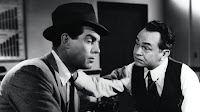January 26, 1973— Edward G. Robinson, who shot to fame in gangster roles in the Thirties that contrasted
sharply with the cultured, thoughtful figure he was offscreen, died at age 79
in Hollywood of bladder cancer.
The actor’s death came two
months before the Academy of Motion Picture Arts and Sciences was due to present
him with an Oscar—albeit an honorary one, rather than in a competitive category—in
recognition of more than four decades of diverse and compelling screen appearances,
the latest for a sci-fi neo-noir he had only just finished shooting, Soylent Green.
Personal and professional
challenges had filled Robinson’s entire career:
*a fellow Warner Brothers
lead who shocked the entire crew by publicly cursing and shoving him on set
(George Raft, in Manpower);
*another, more powerful
entertainer whose fast pace meshed poorly with Robinson’s deliberate style of rehearsal
and preparation (Frank Sinatra, in A Hole in the Head);
*“graylisting” in the
McCarthy era for leftist associations that even an appearance as a “friendly
witness” before the House Un-American Activities Committee could not mitigate;
*an expensive divorce
that saw him lose a substantial portion of his prized art collection; and
*a son struggling with drink,
depression and run-ins with the law.
But only a lifetime of
professionalism—and precautions taken by caring, admiring on-set colleagues—got
Robinson through the final scenes of his career, in Soylent Green. He had
not said anything to his co-workers about his cancer diagnosis.
The film’s insurance
company felt squeamish about the actor’s age and prior health issues (e.g., a
cardiac condition that had forced him to withdraw as Dr. Zaius in Planet of
the Apes), so his scenes were shot first and he was allowed to leave the
set each day at five.
But now another health
complication emerged: Robinson could barely hear, including when director Richard
Fleischer yelled “cut.”
Robinson correctly saw
that this supporting role, as father figure and mentor to Charlton Heston’s
detective, was a great, scene-stealing part to play. So he worked relentlessly
with other actors to get down the timing of the scene right—even though he
could not hear the lines.
At the start of
production, when Fleischer was introduced to Robinson, “The entire crew stared
at him like a bunch of fans or tourists,” the director later recalled in an interview.
That respect only grew during filming.
Heston brought Robinson a
variety of wines and cheeses from all over the world each day the elderly actor
was on set. In mid-December, the crew held a birthday party for him where their
admiration was evident.
Heston concisely depicted
Robinson’s heroic struggle—and the crew’s respect for it—in The Actor’s Life: Journal 1956–1976:
“He knew while we were
shooting, though we did not, that he was terminally ill. He never missed an
hour of work, nor was late to a call. He never was less than the consummate
professional he had been all his life. I’m still haunted, though, by the
knowledge that the very last scene he played in the picture, which he knew was
the last day’s acting he would ever do, was his death scene. I know why I was
so overwhelmingly moved playing it with him.”
As Rico Bandello in Little
Caesar (1931), Robinson paved the way for James Cagney and Humphrey Bogart
in later Warner Brothers gangster roles. His small stature and a homely face often
likened to a pug prevented him from taking on the romantic leads that later
came to these younger actors.
Yet DVDs—not to mention
prolonged exposure to his filmography on TCM—should be enough to convince
anyone of the range that Robinson could display, even with his physical limitations.
He could turn naturally to film noirs (The Woman in the Window and Scarlet
Street), biopics (Dr. Ehrlich's Magic Bullet), Biblical epics (The
Ten Commandments), westerns (Cheyenne Autumn), and even comedies (A
Slight Case of Murder).
(The image accompanying
this post shows Robinson in what I regard as his best performance: here with
Fred MacMurray, as Barton Keyes, the dogged insurance investigator and moral center
of Billy Wilder’s 1944 film noir classic, Double Indemnity.)

No comments:
Post a Comment